Home » PGEU Annual Conference 2025: Building a Resilient Pharmacy Workforce for the Future
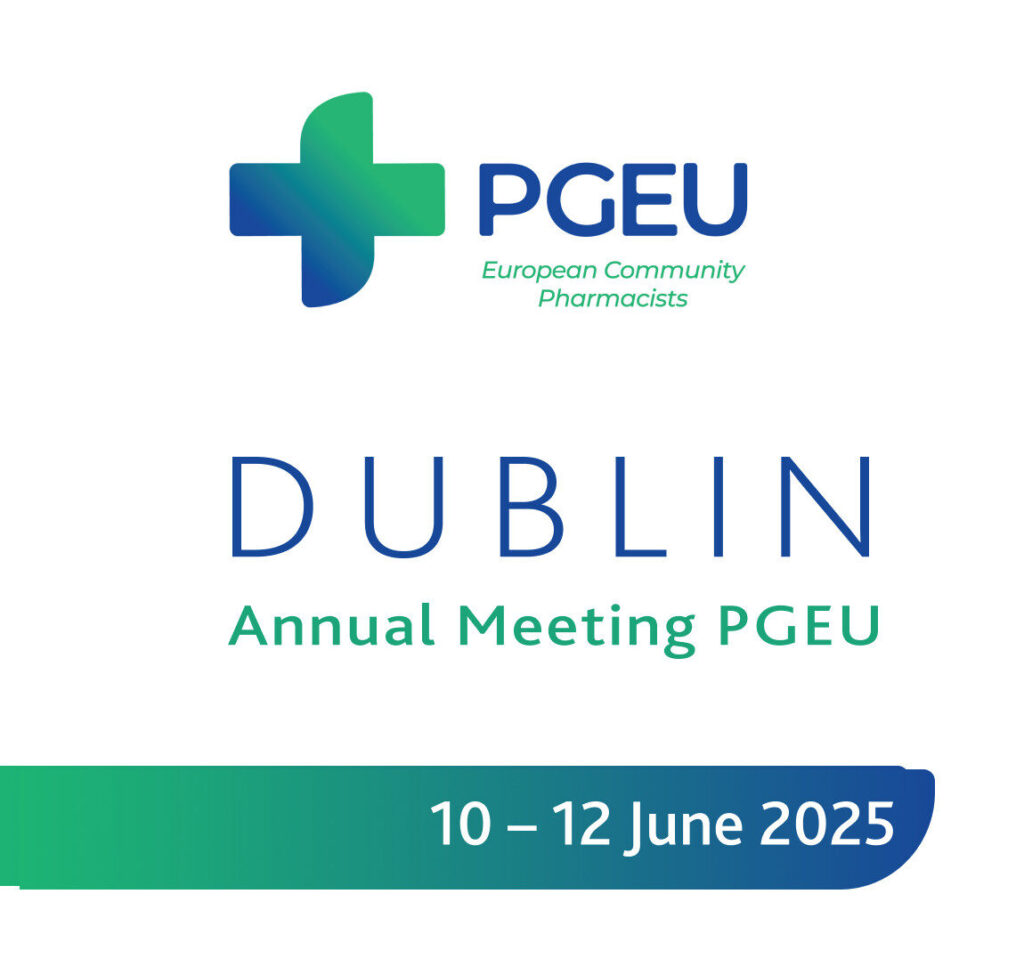
Pharmacy leaders from across Europe convened in Dublin on 11 June 2025 for the Annual Conference of the Pharmaceutical Group of the European Union (PGEU), under the theme of ‘Building a Resilient Pharmacy Workforce for the Future’. The event provided a forum to discuss the future of the pharmacy profession at a time when workforce challenges, health system reform and patient expectations continue to evolve at pace across Europe.
The conference brought together pharmacy representatives, educators, policymakers, students and practising pharmacists to explore solutions that will sustain and strengthen the community pharmacy sector. Over a packed agenda, the programme focused on how to support and develop a resilient pharmacy workforce, capable of delivering expanded services and meeting the future needs of healthcare systems in every corner of Europe.
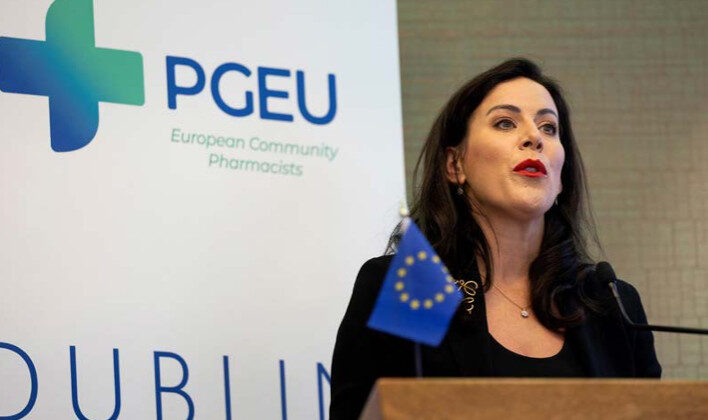
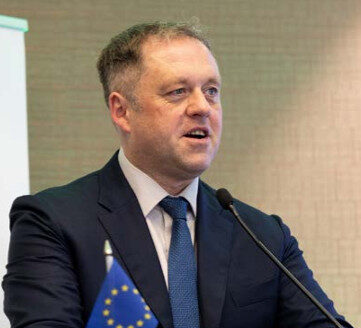 Minister of State for European Affairs Thomas Byrne addressing the conference.
Minister of State for European Affairs Thomas Byrne addressing the conference.
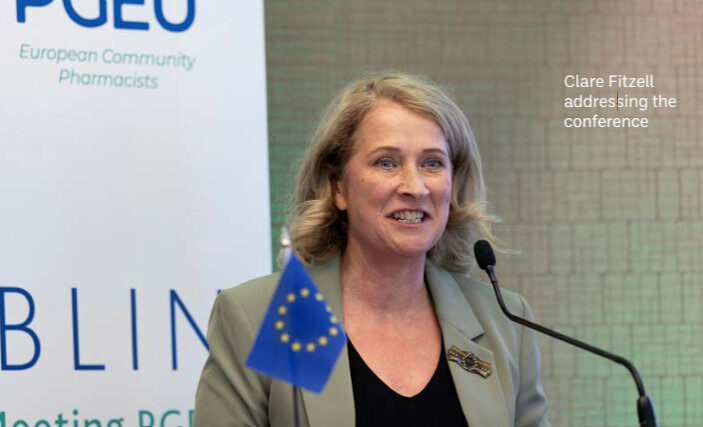
I had the honour as PGEU President, to welcome the Minister for Health, Jennifer Carroll MacNeill TD to open the conference. This provided me with the opportunity to set out that pharmacy across Europe is at a crossroads, as we are seeing rising demands, growing patient expectations, and exciting new opportunities in public health such as chronic disease management, and more patient orientated services. However, to be able to deliver more for health systems, we need a resilient, supported, and well-equipped workforce. I thanked Minister Carroll MacNeill for her strong commitment to ensuring that vision becomes reality, before she began her address.
Minister Carroll MacNeill, who spoke to an audience of European pharmacy leaders, regulators, educators and students, highlighted the pharmacy profession’s value and emphasised the Irish Government’s ambitions for the sector.
“Community pharmacists are essential partners in the delivery of healthcare,” Minister Carroll MacNeill said; “The future of community pharmacy is bright with real and meaningful opportunities for both our health service and pharmacies on many fronts. Governments, particularly the Irish Government, remain committed to supporting community pharmacy services through investment, reform and modernisation.”
Referencing the Expert Taskforce report on the Expansion of the Role of Pharmacy, Minister Carroll MacNeill outlined a clear commitment to further innovation; “We want a future where Ireland leads the way at a European level in services available through community pharmacy”.
Later in the day, Minister of State for European Affairs and Defence Thomas Byrne TD addressed the conference in a keynote speech focusing on medicine shortages and Europe’s policy response. I introduced the Minister, outlining that the time pharmacists now spend each week across Europe in sourcing medicines is more than 11 hours a week, on average.
Minister Byrne described pharmacists as “pillars of the community” and praised the sector for its resilience. He welcomed the European Commission’s Critical Medicines Act as a key step forward and noted that Ireland is ready to play a leadership role in advancing healthcare policy when it takes on the Presidency of the Council of the European Union in 2026; “Preparations are already well underway,” Minister Byrne said. “Ireland supports the potential of the Critical Medicines Act. We believe that, as part of a complete solution, the proposal will assist in addressing medicine shortages and inequitable access to medicines across the EU. The Irish Government will work closely, and speedily with fellow Member States, to shape and progress the final Act over the coming months. We want to ensure that the final Act benefits all of the key stakeholders in Ireland.”
The conference featured two major panel discussions, bringing together expert speakers from across the pharmacy profession and beyond.
The panel entitled, ‘Future-proofing pharmacy: aligning workforce strategy with expanded scope of practice’ was opened by Joanne Kissane, Registrar and Chief Officer of the PSI, and a member of the Expert Taskforce. She outlined the goals of the Taskforce in ensuring pharmacists are empowered to manage common conditions, extend prescriptions, and in time, become independent prescribers. She noted, “empowering pharmacists to use their expertise to assess and treat certain conditions will help patients get the care they need sooner and closer to home”. Ms Kissane stressed the importance of coordinated implementation, including legislation, IT systems, training and public communications to support these services being delivered safely and effectively. She called for coordinated support for robust workforce strategies that reflect pharmacists’ evolving scope of practice.
Moderated by Susan O’Dwyer, IPU Head of Professional Services, the panel featured: Eileen Rocard, Economist and Analyst, OECD; Daragh Connolly, Chair, Board of Pharmaceutical Practice, FIP; and Susana Leonor Araújo, Vice President, European Pharmacy Students’ Association.
Speakers explored how workforce pressures and skill shortages are being felt across Europe, and how pharmacists must be enabled, not overloaded as new services are introduced. There was broad agreement that now is the time for practical workforce planning and the need for accurate data in that regard. Key topics discussed in this session included the need for continued investment in new roles, and an honest focus on pharmacist retention and job satisfaction.
Later, in the session titled ‘Upskilling and resilience: Preparing the pharmacy workforce for the future’, Katherine Morrow, President of the PSI and Director of APPEL, focused on the APPEL experiential learning model as a cornerstone of pharmacy education. She highlighted APPEL’s centralised placement system, quality assurance processes and support for both students and placement providers. Ms Morrow underlined the importance of lifelong learning, workforce planning and recruitment strategies, and noted that a sustainable workforce must be supported with structured opportunities for career progression, mentorship and continuous professional development.
Chaired by Jorge Batista, Senior Professional Affairs Advisor at PGEU, the panel featured: Professor Borut Božič, President, European Pharmacy Faculties Association; Professor Róisín O’Hare, Executive Board Member, European Association of Hospital Pharmacists; and Professor Helder Mota Filipe, President, Portuguese Pharmaceutical Society.
From initial education to mid-career support, the panel emphasised that the pharmacy workforce of the future will need to be flexible, digitally confident, and supported to grow throughout their careers. For many in attendance, the message was clear: education and policy must now work together to reflect the real-world experience of pharmacists.
Alongside policy and professional dialogue, the conference adopted two key PGEU position papers: one on the Critical Medicines Act, and another on Artificial Intelligence in Pharmacy Practice. Both will guide PGEU Advocacy work at a European level over the coming year and ensure that the pharmacist’s voice is heard in a busy EU legislative reform agenda.
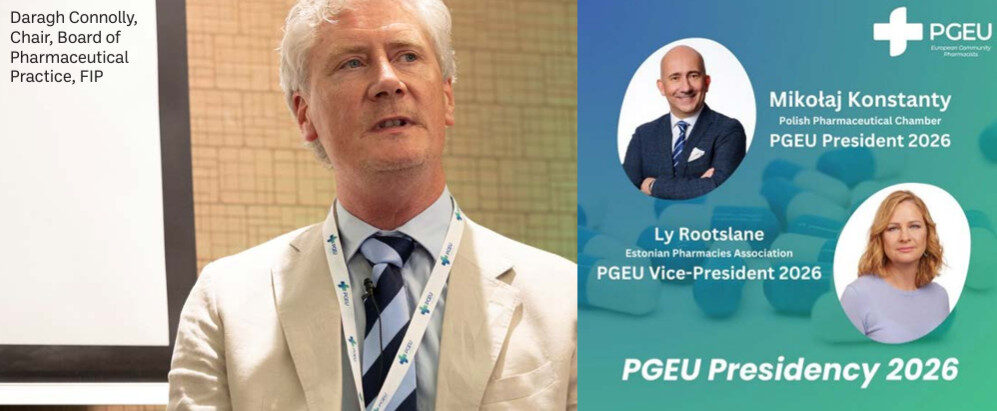
It was a very opportune time to hold this event of European pharmacy leaders in Dublin, when the Irish profession is at a pivotal point. Having two Government Ministers present to listen to proceedings allowed us to reinforce our core message — pharmacists are ready to lead, ready to innovate, and ready to do more for their patients. Now it is time to match that ambition with action. The conference was a moment of pride for Irish pharmacy, and particularly the IPU. It not only reflected the professionalism and commitment of community pharmacists across the country but also placed Ireland in a leadership position on the European stage.
For community pharmacists reading this across Ireland in their busy dispensaries, consultation rooms and pharmacies, the conversations in Dublin were about your future. About ensuring that your training, your contribution and your potential are fully recognised. And about making sure that your role continues to grow in ways that are meaningful, sustainable and rewarding.

Secretary General, IPU and President, PGEU
Highlighted Articles